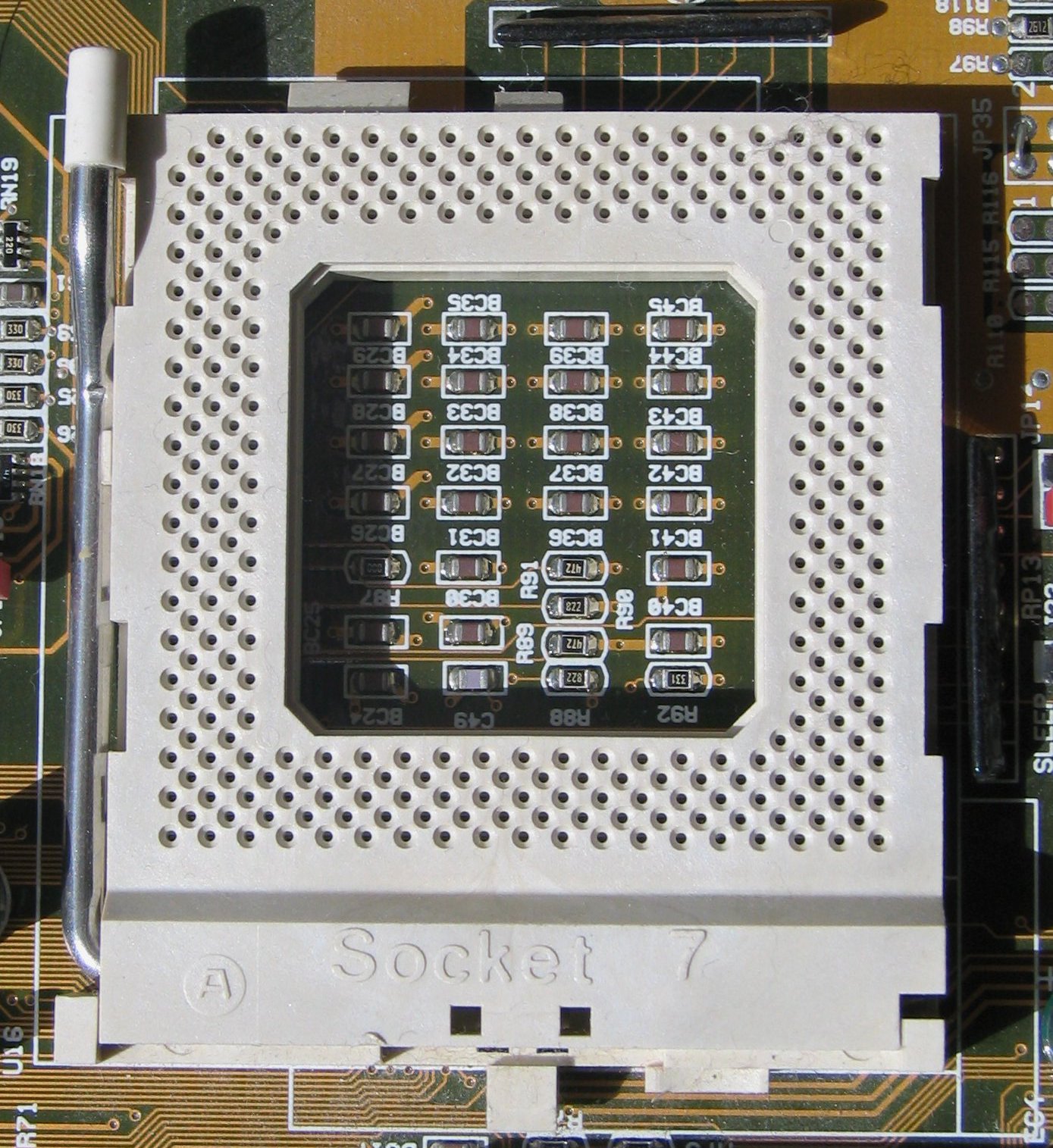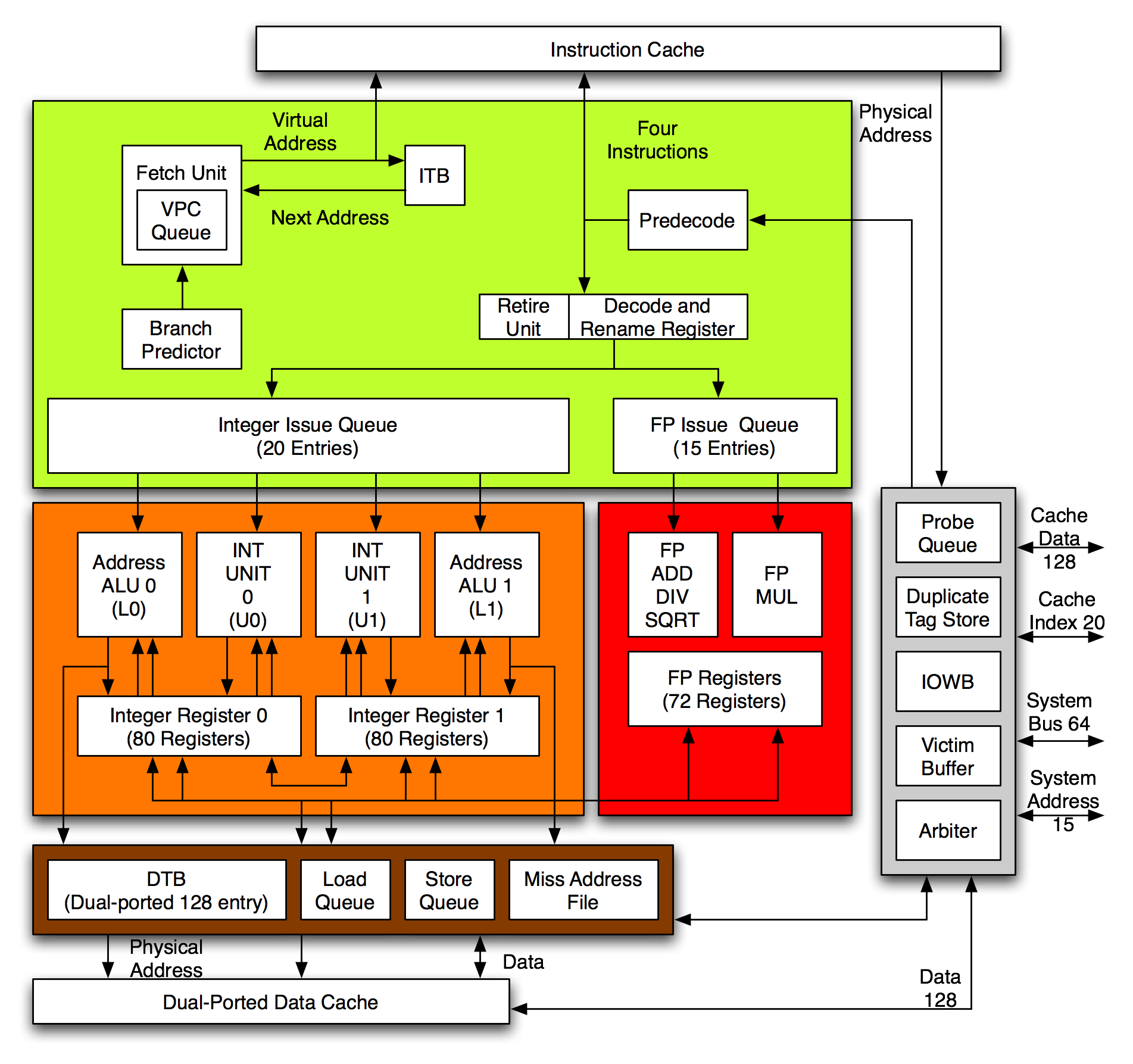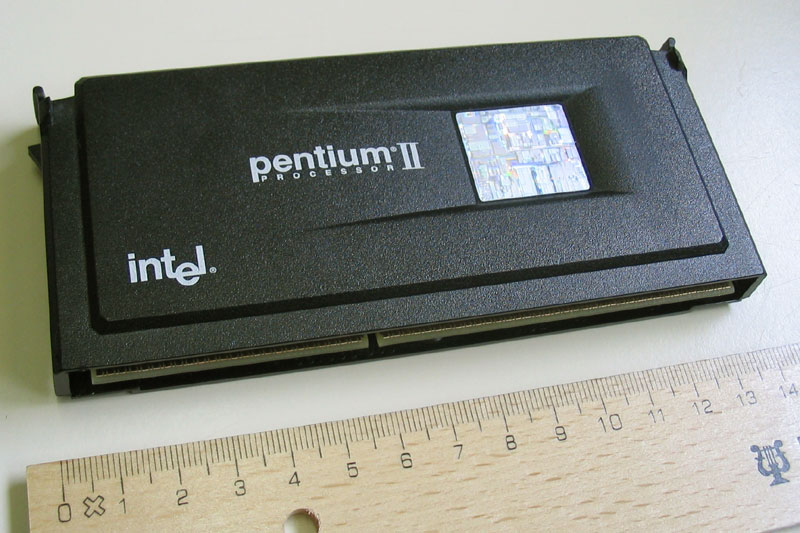|
Slot A
Slot A is the physical and electrical specification for a 242-lead single-edge-connector used by early versions of AMD's Athlon processor. The Slot A connector allows for a higher bus rate than Socket 7 or Super Socket 7. Slot A motherboards use the EV6 bus protocol, a technology originally developed by Digital Equipment Corporation (DEC) for its Alpha 21264 microprocessor. Slot A is mechanically compatible but electrically incompatible with Intel's Slot 1. As a consequence, Slot A motherboards were designed to have the connector's installed orientation be rotated 180 degrees relative to Slot 1 motherboards to discourage accidental insertion of a Slot 1 processor into a Slot A motherboard, and vice versa. The choice to use the same mechanical connector as the Intel Slot 1 also allowed motherboard manufacturers to keep costs down by stocking the same part for both Slot 1 and Slot A assemblies. Slot A was superseded by Socket A. See also * List of AMD microprocessors This a ... [...More Info...] [...Related Items...] OR: [Wikipedia] [Google] [Baidu] |
Slot A
Slot A is the physical and electrical specification for a 242-lead single-edge-connector used by early versions of AMD's Athlon processor. The Slot A connector allows for a higher bus rate than Socket 7 or Super Socket 7. Slot A motherboards use the EV6 bus protocol, a technology originally developed by Digital Equipment Corporation (DEC) for its Alpha 21264 microprocessor. Slot A is mechanically compatible but electrically incompatible with Intel's Slot 1. As a consequence, Slot A motherboards were designed to have the connector's installed orientation be rotated 180 degrees relative to Slot 1 motherboards to discourage accidental insertion of a Slot 1 processor into a Slot A motherboard, and vice versa. The choice to use the same mechanical connector as the Intel Slot 1 also allowed motherboard manufacturers to keep costs down by stocking the same part for both Slot 1 and Slot A assemblies. Slot A was superseded by Socket A. See also * List of AMD microprocessors This a ... [...More Info...] [...Related Items...] OR: [Wikipedia] [Google] [Baidu] |
Pin Grid Array
A pin grid array (PGA) is a type of integrated circuit packaging. In a PGA, the package is square or rectangular, and the pins are arranged in a regular array on the underside of the package. The pins are commonly spaced 2.54 mm (0.1") apart, and may or may not cover the entire underside of the package. PGAs are often mounted on printed circuit boards using the through hole method or inserted into a socket. PGAs allow for more pins per integrated circuit than older packages, such as dual in-line package (DIP). PGA variants Plastic Plastic pin grid array (PPGA) packaging was used by Intel for late-model Mendocino core Celeron processors based on Socket 370. Some pre-Socket 8 processors also used a similar form factor, although they were not officially referred to as PPGA. Flip chip A flip-chip pin grid array (FC-PGA or FCPGA) is a form of pin grid array in which the die faces downwards on the top of the substrate with the back of the die exposed. This ... [...More Info...] [...Related Items...] OR: [Wikipedia] [Google] [Baidu] |
Single Edge Contact Cartridge
Slot 1 refers to the physical and electrical specification for the connector used by some of Intel's microprocessors, including the Pentium Pro, Celeron, Pentium II and the Pentium III. Both single and dual processor configurations were implemented. Intel reverted to the traditional socket interface with Socket 370 in 1999. General With the introduction of the Pentium II CPU, the need for greater access for testing had made the transition from socket to slot necessary. Previously with the Pentium Pro, Intel had combined processor and cache dies in the same Socket 8 package. These were connected by a full-speed bus, resulting in significant performance benefits. Unfortunately, this method required that the two components be bonded together early in the production process, before testing was possible. As a result, a single, tiny flaw in either die made it necessary to discard the entire assembly, causing low production yield and high cost. Intel subsequently designed a ci ... [...More Info...] [...Related Items...] OR: [Wikipedia] [Google] [Baidu] |
Advanced Micro Devices
Advanced Micro Devices, Inc. (AMD) is an American multinational semiconductor company based in Santa Clara, California, that develops computer processors and related technologies for business and consumer markets. While it initially manufactured its own processors, the company later outsourced its manufacturing, a practice known as going fabless, after GlobalFoundries was spun off in 2009. AMD's main products include microprocessors, motherboard chipsets, embedded processors, graphics processors, and FPGAs for servers, workstations, personal computers, and embedded system applications. History First twelve years Advanced Micro Devices was formally incorporated by Jerry Sanders, along with seven of his colleagues from Fairchild Semiconductor, on May 1, 1969. Sanders, an electrical engineer who was the director of marketing at Fairchild, had, like many Fairchild executives, grown frustrated with the increasing lack of support, opportunity, and flexibility wi ... [...More Info...] [...Related Items...] OR: [Wikipedia] [Google] [Baidu] |
Athlon
Athlon is the brand name applied to a series of x86-compatible microprocessors designed and manufactured by Advanced Micro Devices (AMD). The original Athlon (now called Athlon Classic) was the first seventh-generation x86 processor and the first desktop processor to reach speeds of one gigahertz (GHz). It made its debut as AMD's high-end processor brand on June 23, 1999. Over the years AMD has used the Athlon name with the 64-bit Athlon 64 architecture, the Athlon II, and Accelerated Processing Unit (APU) chips targeting the Socket AM1 desktop SoC architecture, and Socket AM4 Zen microarchitecture. The modern Zen-based Athlon with a Radeon Graphics processor was introduced in 2019 as AMD's highest-performance entry-level processor. Athlon comes from the Ancient Greek (''athlon''), meaning "(sport) contest", or "prize of a contest", or "place of a contest; arena". With the Athlon name originally used for AMD's high-end processors, AMD currently uses Athlon for ... [...More Info...] [...Related Items...] OR: [Wikipedia] [Google] [Baidu] |
Super Socket 7
Super Socket 7, also referred to as Super 7, is a hardware-level extension of the Socket 7 ZIF socket specification for x86 processors. Compatible motherboards and chipsets use a standard Socket 7 connection for the CPU, while adding certain features including a maximum 100 MHz front-side bus and support for AGP graphics cards. Super Socket 7 was used by AMD K6-2 and K6-III processors, some of the final Cyrix M-II processors, some of the final IDT WinChip 2 processors, and Rise mP6 processors. It is backward compatible with Socket 7 CPUs, meaning a Socket 7 CPU can be used with a Super Socket 7 motherboard, but a Super Socket 7 CPU cannot operate at full speed in a Socket 7 motherboard. Socket 5 CPUs are pin-compatible with Super Socket 7, but not all motherboards designed for Super Socket 7 supported the voltages or bus speeds needed for Socket 5 CPUs. While AMD had previously always used Intel sockets for their processors, Socket 7 was the last one for which AMD ... [...More Info...] [...Related Items...] OR: [Wikipedia] [Google] [Baidu] |
Socket A
Socket A (also known as Socket 462) is a zero insertion force pin grid array (PGA) CPU socket used for AMD processors ranging from the Athlon Thunderbird to the Athlon XP/MP 3200+, and AMD budget processors including the Duron and Sempron. Socket A also supports AMD Geode NX embedded processors (derived from the Mobile Athlon XP). The socket is a zero insertion force pin grid array type with 462 pins (nine pins are blocked in the socket to prevent accidental insertion of Socket 370 CPUs, hence the number 462). The front-side bus frequencies supported for the AMD Athlon XP and Sempron are 133 MHz, 166 MHz, and 200 MHz. Socket A supports 32-bit CPUs only. Socket A was replaced by Socket 754 and Socket 939 during 2003 and 2004 respectively, except for its use with Geode NX processors. Technical specifications * Support of processor clock-speeds between 600 MHz (Duron) to 2333 MHz (Athlon XP 3200+) * Double data rate 100, 133, 166 and 200 MHz front ... [...More Info...] [...Related Items...] OR: [Wikipedia] [Google] [Baidu] |
Socket 7
Socket 7 is a physical and electrical specification for an x86-style CPU socket on a personal computer motherboard. It was released in June 1995. The socket supersedes the earlier Socket 5, and accepts P5 Pentium microprocessors manufactured by Intel, as well as compatibles made by Cyrix/ IBM, AMD, IDT and others. Socket 7 was the only socket that supported a wide range of CPUs from different manufacturers and a wide range of speeds. Differences between Socket 5 and Socket 7 are that Socket 7 has an extra pin and is designed to provide dual split rail voltage, as opposed to Socket 5's single voltage. However, not all motherboard manufacturers supported the dual voltage on their boards initially. Socket 7 is backwards compatible; a Socket 5 CPU can be inserted and used on a Socket 7 motherboard. Processors that used Socket 7 are the AMD K5 and K6, the Cyrix 6x86 and 6x86MX, the IDT WinChip, the Intel P5 Pentium (2.5–3.5 V, 75–200 MHz), the Pentium MMX (166� ... [...More Info...] [...Related Items...] OR: [Wikipedia] [Google] [Baidu] |
Digital Equipment Corporation
Digital Equipment Corporation (DEC ), using the trademark Digital, was a major American company in the computer industry from the 1960s to the 1990s. The company was co-founded by Ken Olsen and Harlan Anderson in 1957. Olsen was president until forced to resign in 1992, after the company had gone into precipitous decline. The company produced many different product lines over its history. It is best known for the work in the minicomputer market starting in the mid-1960s. The company produced a series of machines known as the PDP line, with the PDP-8 and PDP-11 being among the most successful minis in history. Their success was only surpassed by another DEC product, the late-1970s VAX "supermini" systems that were designed to replace the PDP-11. Although a number of competitors had successfully competed with Digital through the 1970s, the VAX cemented the company's place as a leading vendor in the computer space. As microcomputers improved in the late 1980s, especially wi ... [...More Info...] [...Related Items...] OR: [Wikipedia] [Google] [Baidu] |
Alpha 21264
The Alpha 21264 is a Digital Equipment Corporation RISC microprocessor launched on 19 October 1998. The 21264 implemented the Alpha instruction set architecture (ISA). Description The Alpha 21264 is a four-issue superscalar microprocessor with out-of-order execution and speculative execution. It has a peak execution rate of six instructions per cycle and could sustain four instructions per cycle. It has a seven-stage instruction pipeline. Out of order execution At any given stage, the microprocessor could have up to 80 instructions in various stages of execution, surpassing any other contemporary microprocessor. Decoded instructions are held in instruction queues and are issued when their operands are available. The integer queue contained 20 entries and the floating-point queue 15. Each queue could issue as many instructions as there were pipelines. Ebox The Ebox executes integer, load and store instructions. It has two integer units, two load store units and two integ ... [...More Info...] [...Related Items...] OR: [Wikipedia] [Google] [Baidu] |
Intel
Intel Corporation is an American multinational corporation and technology company headquartered in Santa Clara, California, Santa Clara, California. It is the world's largest semiconductor chip manufacturer by revenue, and is one of the developers of the x86 series of instruction sets, the instruction sets found in most personal computers (PCs). Delaware General Corporation Law, Incorporated in Delaware, Intel ranked No. 45 in the 2020 Fortune 500, ''Fortune'' 500 list of the largest United States corporations by total revenue for nearly a decade, from 2007 to 2016 fiscal years. Intel supplies microprocessors for List of computer system manufacturers, computer system manufacturers such as Acer Inc., Acer, Lenovo, HP Inc., HP, and Dell Technologies, Dell. Intel also manufactures motherboard chipsets, network interface controllers and integrated circuits, flash memory, Graphics processing unit, graphics chips, Embedded system, embedded processors and other devices related to com ... [...More Info...] [...Related Items...] OR: [Wikipedia] [Google] [Baidu] |
Slot 1
Slot 1 refers to the physical and electrical specification for the connector used by some of Intel's microprocessors, including the Pentium Pro, Celeron, Pentium II and the Pentium III. Both single and dual processor configurations were implemented. Intel reverted to the traditional socket interface with Socket 370 in 1999. General With the introduction of the Pentium II CPU, the need for greater access for testing had made the transition from socket to slot necessary. Previously with the Pentium Pro, Intel had combined processor and cache dies in the same Socket 8 package. These were connected by a full-speed bus, resulting in significant performance benefits. Unfortunately, this method required that the two components be bonded together early in the production process, before testing was possible. As a result, a single, tiny flaw in either die made it necessary to discard the entire assembly, causing low production yield and high cost. Intel subsequently designed a ... [...More Info...] [...Related Items...] OR: [Wikipedia] [Google] [Baidu] |
_CPU-pins_PNr°0295.jpg)







